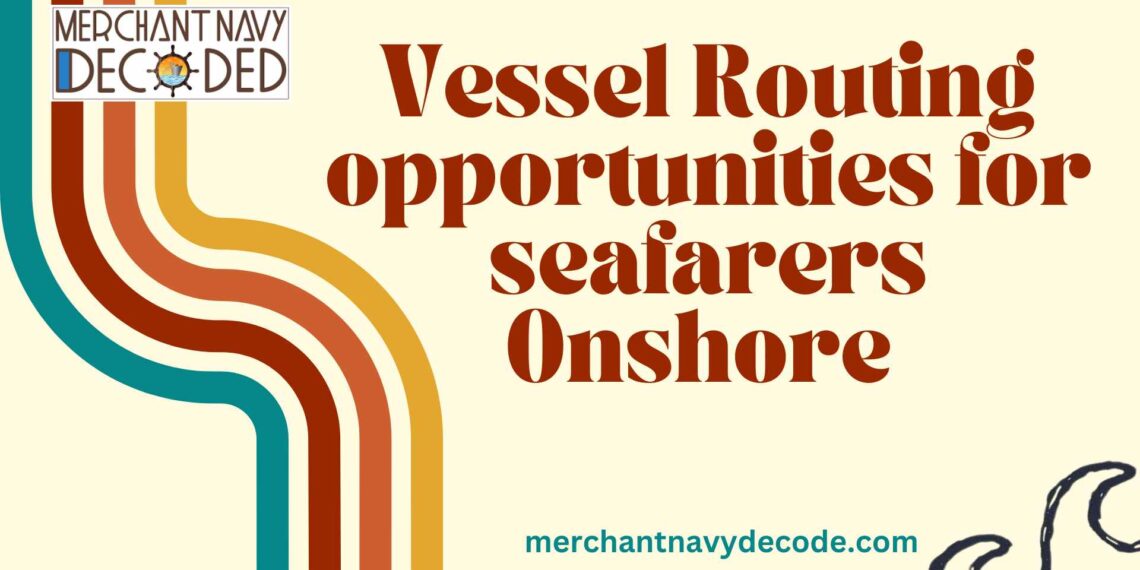Vessel Routing opportunities for seafarers Onshore
Table of contents
1. Overview
The Indian maritime industry is experiencing a growing demand for skilled professionals in vessel routing. The salary prospects are competitive, ranging from 8 to 20 lakhs for second officers and 33 to 40 lakhs for captains. To succeed in this field, you need to understand vessel handling, weather report interpretation, and proficiency in navigation and technology. Short-term commercial courses and data processing skills are also essential to navigate the complexities of the job.
If you’re interested in applying for vessel routing positions, you can do so through placement consultants or directly to companies. It’s important to have a well-crafted CV and a professional LinkedIn profile to increase your chances of success in this dynamic field.
2. What is vessel routing?

Vessel routing, also called ship routing, is the way of figuring out and planning the best path for a ship to travel from one place to another. This involves finding the safest and most efficient route, considering things like the weather, ocean currents, traffic rules, and the specific features of the ship.
The main aim of vessel routing is to make sure that ships can travel safely and reach their destination on time. It involves careful navigation to avoid dangers, use fuel wisely, and follow the sailing rules. Vessel routing is especially important for long trips, where things like weather and currents can make a big difference.
Modern vessel routing uses advanced technologies like weather forecasts, satellite navigation, and electronic maps to improve route planning. This helps people in the maritime industry, like ship captains and navigators, make smart decisions to keep the journey safe, efficient, and overall successful.
Explore our Ship to Shore Guidance series for Deck Officer
3. Opportunities in Vessel Routing
3.1 Opportunities for Second Officers
- Navigational Roles: Second Officers play a critical part in vessel navigation, ensuring the vessel’s safety by executing planned routes and making real-time decisions based on weather conditions.
- Career Progression: Experienced Second Officers can advance to higher positions, aiming for roles like Chief Officer and Captain. Continuous learning and obtaining higher-level certifications contribute to career growth.
- Specialized Vessels: Depending on the vessel type, Second Officers may work on specialized ships, such as container ships, oil tankers, LNG carriers, or cruise liners, each offering unique challenges and learning experiences.
- Global Opportunities: The maritime industry provides global opportunities, allowing Second Officers to travel to different parts of the world and gain exposure to diverse cultures and maritime practices.
3.2 Opportunities for Masters (Captains) in Vessel Routing

- Leadership Roles: Captains lead the entire vessel and its crew, managing operations to ensure safe and efficient voyages.
- Consultancy and Training: Experienced Captains may work in maritime consultancy or training roles, sharing their expertise with newer generations of maritime professionals.
- Executive Positions: Captains can pursue executive positions within shipping companies or maritime organizations, involving responsibilities related to fleet management, operations, or safety and compliance.
- Pilotage Opportunities: In some regions, experienced Captains may work as marine pilots, guiding vessels through challenging waterways or into ports where local knowledge is crucial for safe navigation.
4. Skills Required for Vessel Routing

4.1 Navigation Skills
- Chart Navigation: Proficiency in reading and interpreting nautical charts is crucial for plotting courses, determining depths, and avoiding navigational hazards.
- Electronic Navigation: Familiarity with electronic navigation systems, such as GPS and ECDIS (Electronic Chart Display and Information System), is essential for modern vessel routing.
4.2 Vessel Handling and Seamanship
- Ship Manoeuvring: Ability to handle and maneuver vessels in various conditions, including docking, undocking, and navigating through confined spaces.
- Anchoring and Mooring: Skills in anchoring and mooring procedures are necessary for safe and efficient operations.
4.3 Weather Interpretation
- Meteorological Knowledge: Understanding weather patterns and interpreting meteorological reports is crucial for planning routes that avoid adverse weather conditions and ensure the safety of the vessel.
4.4. Communication Skills
- Bridge Communication: Clear communication within the bridge team is vital for ensuring everyone is informed and aware of the vessel’s status and any changes in the route plan.
- Radio Communication: Proficiency in maritime radio communication, including understanding and following VHF (Very High Frequency) protocols.
4.6 Technology Skills
- E navigation: Knowledge of modern electronic navigation tools and software to enhance route planning and execution.
- Data Processing: Ability to process and analyze data related to navigation, weather, and vessel performance.
4.7 Crisis Management
- Emergency Response: Preparedness to handle emergencies at sea, including knowledge of emergency procedures, crisis communication, and coordination of emergency drills.
4.8 DecisionMaking and Critical Thinking
- Risk Assessment: The ability to assess risks and make informed decisions to ensure the safety of the vessel, crew, and cargo.
- ProblemSolving: Quick thinking and problem-solving skills to address unexpected challenges during a voyage.
4.9 Leadership and Team Management
- Bridge Leadership: For Captains, effective leadership on the bridge, including managing the bridge team and collaborating with other departments.
- Crew Management: Ability to manage and motivate the crew, fostering a positive and efficient working environment
4.10 Regulatory Compliance
- Knowledge of Regulations: Awareness of and adherence to international maritime regulations, including SOLAS (International Convention for the Safety of Life at Sea) and COLREGs (International Regulations for Preventing Collisions at Sea).
- Continuous Learning: Professional Development: Commitment to continuous learning, staying updated on industry trends, new technologies, and advancements in maritime safety.
- Developing and maintaining these skills is essential for a successful career in vessel routing, whether as a Second Officer navigating the vessel or as a Captain leading the crew and vessel operations.
5. Salary in Vessel Routing
5.1 Second Officers
- Starting Salary: Second Officers in the maritime industry can expect a starting salary ranging from 8 to 10 lakhs per annum.
- Mid-career Salary: With a few years of experience, the mid-career salary for Second Officers can rise to 12 to 15 lakhs per annum.
- Experienced Professionals: As Second Officers gain more experience, their salaries can reach up to 20 lakhs per annum or even higher, depending on factors such as the type of vessel, company, and additional certifications.
5.2 Masters (Captains)
- Starting Salary: Captains typically enjoy higher starting salaries compared to Second Officers, ranging from 33 to 35 lakhs per annum.
- MidCareer Salary: With increased responsibility and experience, mid-career Captains can earn between 38 to 42 lakhs per annum.
- Experienced Professionals: The salary for experienced Captains can be significantly higher, reaching up to 50 lakhs per annum or more. Captains with extensive experience, expertise, and leadership skills may negotiate even higher compensation.
5.3 Additional Factors Affecting Salaries
- Type of Vessel: The type of vessel can impact salaries. Captains and Second Officers working on specialized vessels such as oil tankers, LNG carriers, or cruise liners may receive higher compensation due to the unique challenges associated with these vessels.
- Company Reputation: Salaries can vary based on the reputation and size of the shipping company. Established and reputable companies may offer more competitive compensation packages.
- Additional Certifications: Holding advanced certifications beyond the mandatory requirements can contribute to higher salaries. Specialized certifications related to vessel routing, safety, or leadership skills may be rewarded with increased compensation.
- Career Progression: Both Second Officers and Captains can experience significant salary increases with each step in their career progression. Moving from Second Officer to Chief Officer and eventually to Captain comes with higher levels of responsibility and compensation.
- Global Opportunities: Seeking opportunities in international waters or with globally operating companies can provide access to higher-paying positions and enhance overall earning potential.
6. Where to Apply for Vessel Routing
6.1 Shipping Companies
- International and National Operators: Apply to both international and national shipping companies, as each may offer different opportunities for career growth.
- Specialized Vessels: Depending on your interests and expertise, target companies that operate specialized vessels such as container ships, oil tankers, LNG carriers, cruise liners, or offshore support vessels.
6.2 Maritime Consultancies and Services
- consulting Firms: Maritime consulting firms may require professionals with expertise in vessel routing. Explore opportunities to work with these firms, offering your skills in route planning, navigation, and technology.
- Safety and Compliance Services: Companies providing services related to maritime safety and compliance may have roles suitable for professionals with a strong background in vessel routing.
6.3 Online Job Platforms
- Maritime Job Websites: Regularly check and apply through dedicated maritime job platforms. Ensure that your profile on these platforms is complete and showcases your qualifications and experience.
- General Job Portals: Some general job portals also feature maritime and shipping industry positions. Keep an eye on platforms like Indeed, Naukri, or Monster for relevant openings.
6.4 Professional Associations
- Join Maritime Associations: Become a member of maritime professional associations or societies. These organizations often provide job boards, industry insights, and networking opportunities that can be valuable in your job search.
- Local and International Associations: Explore both local and international associations to broaden your job search scope.
7. How to Apply for Vessel Routing Jobs
7.1 Placement Consultants
- Engage with Maritime Recruitment Agencies: Many maritime recruitment agencies specialize in connecting skilled professionals with shipping companies. Registering with these agencies and submitting your updated CV can be an effective way to explore job opportunities.
- Online Job Portals: Utilise online job portals that cater specifically to maritime and shipping industry jobs. Platforms like MarineCrew, Sea Career, and Martide are popular among maritime professionals.
7.2 Direct Application to Companies
- Research Shipping Companies: Identify shipping companies that operate vessels and have a presence in your desired sector (e.g., container shipping, oil and gas transportation, cruise liners).
- Visit Company Websites: Explore the official websites of these companies to find dedicated career sections or contact information for submitting applications.
- Send Direct Applications: Prepare a comprehensive CV highlighting your maritime qualifications, skills, and experience. Submit your application directly to the human resources or recruitment department of the chosen companies. Attach relevant documents such as certificates, licenses, and references.
7.3 Networking
- Attend Maritime Events and Conferences: Participate in maritime events, conferences, and seminars where you can meet industry professionals. Networking at these events can lead to valuable connections and potential job opportunities.
- LinkedIn Networking: Enhance your professional presence on LinkedIn by updating your profile with relevant skills, experience, and certifications. Connect with professionals in the maritime sector, join industry groups, and engage in discussions to expand your network.
8. Conclusion
In conclusion, a career in vessel routing offers a dynamic and rewarding journey within the maritime industry. Aspiring professionals can expect to navigate not only through seas and waterways but also through diverse challenges and global opportunities. The prospect of continuous learning, exposure to different cultures, and the responsibility of ensuring the safety of the vessel and its crew make vessel routing a compelling career choice.
For Second Officers and Captains alike, the pathway to success involves honing essential skills such as navigation expertise, weather interpretation, and effective communication. The competitive salaries and potential for career growth underscore the value placed on the crucial role these professionals play in ensuring the efficiency and safety of maritime operations.
Disclaimer :- The opinions expressed in this article belong solely to the author and may not necessarily reflect those of Merchant Navy Decoded. We cannot guarantee the accuracy of the information provided and disclaim any responsibility for it. Data and visuals used are sourced from publicly available information and may not be authenticated by any regulatory body. Reviews and comments appearing on our blogs represent the opinions of individuals and do not necessarily reflect the views of Merchant Navy Decoded. We are not responsible for any loss or damage resulting from reliance on these reviews or comments.
Reproduction, copying, sharing, or use of the article or images in any form is strictly prohibited without prior permission from both the author and Merchant Navy Decoded.



